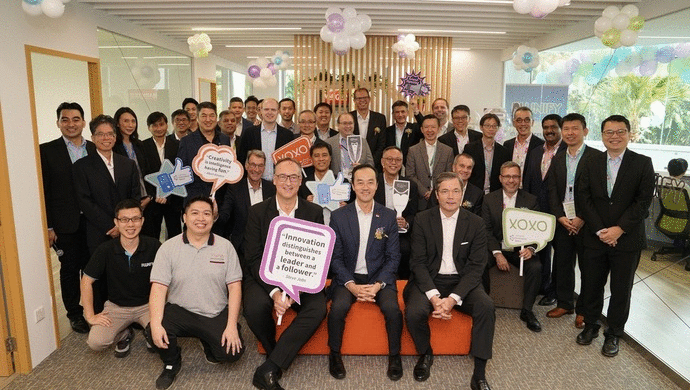The German semiconductor has launched a “Co-Innovation” space

German semiconductor Infineon Technologies has been in the business for nearly 20 years. But like many corporations and MNCs, in recent years, it has ramping up its innovation initiatives to help it stay ahead in the industry.
Last month, Infineon unveiled a 250 sqm “Co-Innovation” space at its Asia Pacific headquarters, with the goal of co-creating new solutions with startups so they can develop better semiconductors.
The startups selected to join the Co-Innovation space will use either Infineon chips or Infineon data to develop technologies centered around energy efficiency, mobility, security, IoT, and Big Data.
By advancing its microelectronics technology, said Chua Chee Seong, President and Managing Director, Infineon Technologies Asia Pacific, the company wants to solve the “three major challenges of generating, transmitting and consuming energy more efficiently; making mobility clean, safe and smart; and providing security in a hyperconnected world.”
Chua said that the introduction of Industry 4.0 elements in the company’s existing plants — a strategy that increases automation and interconnectivity between various manufacturing processes — means that it no longer viable to buy an off-the-shelf solution.
To that end, it has become necessary to work with startups. This is a mutually beneficial relationship because startups get to test out their products in real situations, as well as gain business contacts to grow their business.
Also Read: Six Singapore fintechs are among the KPMG’s Fintech100
For Infineon outsourcing their pain points to startups means it can tap into their leanness and creativity — and the often espoused “fail fast, iterate fast” mindset — to create new solutions quickly.
“As a company, we are a strong believer of innovation and we know that diversity is an important element to drive an innovation culture. Within Infineon, if we remain mono-vision in our innovation culture, we could hit a speed limit in innovation because we live within this box of our own culture,” said Chua.
“Each of the startups come in with a different mindset, a different company culture. This could change the way our engineers think and act when they work closely with the startups here at Infineon,” he said.
“Infineon can support startups as an established company that knows how to bring ideas to markets globally and how to industrialize and drive to scale. So, ultimately, this Co-Innovation Space will be a win-win for both Infineon and our startups,” he emphasised.
Infineon selected four Singapore startups for its initial partnerships. These startups have already “grown beyond the seed stage and into the scale-up stage” and have at least a working prototype or a viable product.
“In short, we looked at the startups’ level of maturity, how far they are into their prototype or startups that already have a product and are in the scale-up mode. Our aim is to help them speed up the process from prototype to commercialization. Most of all, a startup must work on solutions within Infineon’s areas of focus,” said Chua.
It will be a close-working relationship, he added, with a rigorous planning and milestones, firm timelines and deliverables so that there are tangible results. “We want to make the time that the startups spend at our space as productive and goal oriented as possible,” he said.
Without further ado, here are the four startups:
Ampotech
Ampotech is an IoT company that collects and analyses electricity usage. Its smart electrical panel system provides insight into energy consumption and activity patterns within a customer’s premises in real time rather than only seeing it all consolidated on the monthly utility bill at the end of the month.
The company’s other products include AmpoHub, an IoT gateway for monitoring single-phase and three-phase equipment and wirelessly transmitting the data to the AmpoCloud platform,
Plunify
Plunify claims it can improve the design and performance of semiconductor chips by optimizing the field-programmable gate array (FPGA) design flow.
It does this by developing on-premise and cloud-based design tools and services. One of them is called InTime, which enables chip design companies to accelerate product time-to-market and reduce development costs. InTime optimises FPGA design performance without modifying the source code.
SHADO
SHADO is an electric vehicle company that develops zero carbon emission two- to four-wheel vehicles. It also designs complete end-to-end fleet charging solutions and cloud-based fleet management systems to keep them running 24/7.
It also has developed other mobility technologies such as powertrain, motor, battery management system, and autonomous driving software.
XNERGY
XNERGY is a startup that develops wireless power transfer and charging technologies for autonomous devices, including mobile robots and mobility vehicles.
—
Image Credit: Infineon
The post How Infineon aims to build better semiconductors with the help of Singapore startups appeared first on e27.